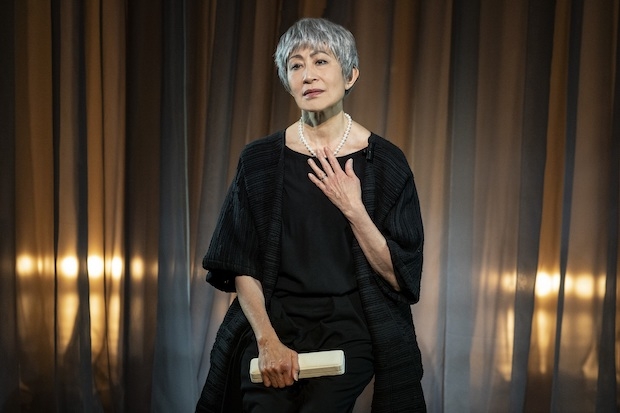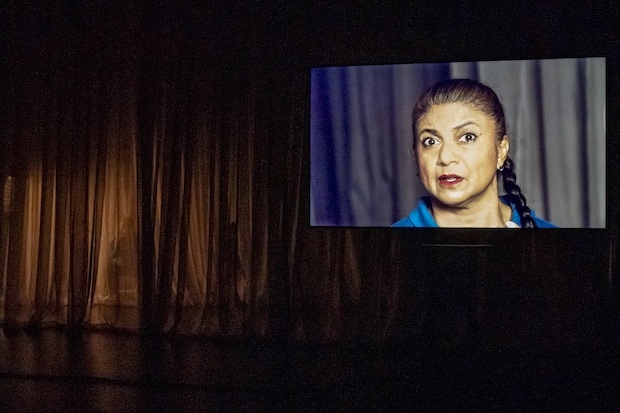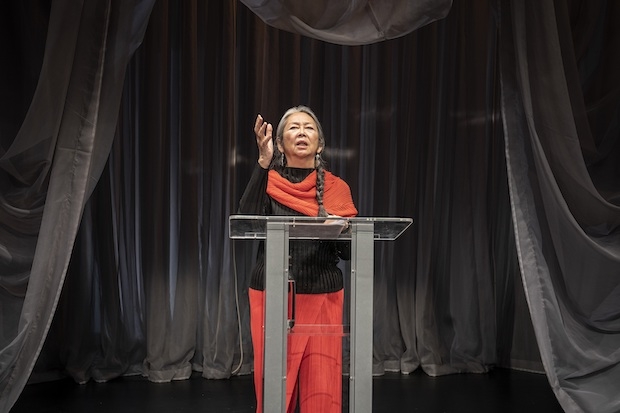Review: Veteran Asian American Stage Actors Take the Spotlight in Out of Time
Mia Katigbak, Page Leong, and more star in an evening of five monologues, co-produced with the National Asian American Theatre Company.

(© Joan Marcus)
So far this season, Broadway and off-Broadway have been shining a particular spotlight on the Black American experience in its premieres and revivals, ranging from Thoughts of a Colored Man and Trouble in Mind on Broadway, to Black No More and Tambo & Bones most recently off-Broadway. By comparison, aside from bits of color-conscious casting here and there, the only Asian American representation glimpsed in NYC theater to date has been in Rajiv Joseph's Letters of Suresh at Second Stage and Kristina Wong, Sweatshop Overlord at New York Theatre Workshop.
That by itself makes the anthology show Out of Time — a world-premiere co-production between the Public Theater and the National Asian American Theatre Company — a noteworthy endeavor. Not only does it feature five new monologues written by Asian American playwrights, but all five give Asian American actors over the age of 60 the kind of acting showcase they aren't normally afforded. If only the short plays themselves were as worthwhile as the concept binding them together.

(© Joan Marcus)
The show starts out with its best monologue. In Anna Ouyang Moench's "My Documentary," Page Leong plays a documentary filmmaker who is in the process of pitching a new film tackling her most personal subject yet: grief resulting from a personal loss. "My Documentary" stands out simply because Moench crafts a memorable central figure. The filmmaker she portrays may be nameless, but she emerges, especially through Leong's magnetic and multifaceted performance, as a distinctly no-nonsense, brutally honest, but also witty and self-aware personality.
"My Documentary" also sets out some of the themes running loosely throughout Out of Time: not only grief and the specter of mortality, but also the idea of an older generation trying to pass on its wisdom and experience to the young. In the show's fourth monologue, Naomi Iizuka's "Japanese Folk Song," Taki (Glenn Kubota) recounts his rather difficult life to his offstage offspring. This short play comes the closest to matching "My Documentary" in its tone of delicate nostalgia and pained remembrance, with Kubota hitting notes of impish delight in playing a character resilient enough to always choose life even in the darkest of times. Alas, Iizuka rather spoils the monologue with a half-baked attempt at self-reflexivity — with Kubota starting off the monologue by claiming he is a "kind of hologram" of Taki before he gets into character — and a cryptically morbid ending.
Jaclyn Backhaus's "Black Market Caviar," performed third, makes literal the concept of intergenerational dialogue by having Carla (Rita Wolf), via a video transmission in 2050, talk to her younger self on December 31, 2019, just before she is about to discover a whole host of familial health trauma on the verge of the Covid pandemic. It's an intriguing idea that remains frustratingly abstract throughout. Mia Chung's "Ball in the Air," performed second, is even more emotionally remote as Chung attempts to juggle multiple plot threads in trying to evoke the confusion and anger inspired by the 2016 US presidential election. Mia Katigbak, the star of "Ball in the Air," can do only so much to impose an emotional through-line to material that stubbornly refuses to cohere.

(© Joan Marcus)
In fact, topical events seem foremost on the mind of these younger playwrights in Out of Time, culminating in Sam Chanse's concluding monologue, "Disturbance Specialist," which features an author, Leonie (Natsuko Ohama), giving an address that turns into an alternately furious and introspective attempt at a self-defense in light of her recently getting cancel ed for vague reasons. Ohama matches "My Documentary"'s Page Leong in caustic wit, making "Disturbance Specialist" watchable even at its most rambling. As a cry of despair at just how volatile and divided American society is these days, Chanse's short play has some residual value, but it ultimately feels like a dead end.
Regardless of how variable its material is though, Out of Time does at least boast the spectacle of some of our most underappreciated Asian American stage performers working in top form. And director Les Waters's affection for this ensemble is apparent in the production surrounding them: from spare, curtain-based scenic design by Dots; to Fabian Obispo's sound design, with classical music heard between monologues and one particular music cue — Thelonious Monk's "Japanese Folk Song," which gives Iizuka's monologue its name — heard at just the right soft volume to evoke the feel of memory. Hopefully Out of Time will not be the only opportunity this year for these actors to shine.









